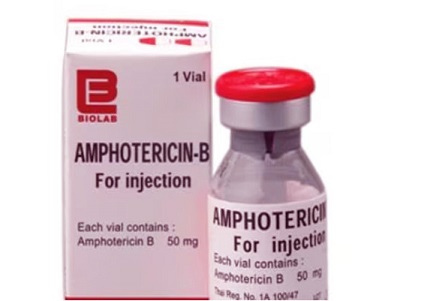British Researchers Warn That Amphotericin B Found to Enhance COVID-19 Infection!
Nikhil Prasad Fact checked by:Thailand Medical News Team Nov 08, 2024 1 year, 3 months, 2 weeks, 1 day, 19 hours, 43 minutes ago
Medical News: Amphotericin B Shows Unexpected Effects on COVID-19 Severity
Researchers from the University of Oxford’s Centre for Human Genetics and Pandemic Sciences Institute, the University of Liverpool’s Institute of Infection, Veterinary and Ecological Sciences, the UK Health Security Agency, the University of Bristol’s School of Cellular and Molecular Medicine, and King’s College London have made a striking discovery regarding Amphotericin B (AmB), a widely used antifungal medication. This study reveals that while AmB is often used to treat secondary fungal infections in COVID-19 patients, it may actually enhance SARS-CoV-2 infection in certain cell types. This
Medical News report delves into the research findings, highlighting the unexpected effects of this medication and its implications for treating fungal infections in COVID-19 cases.
 British Researchers Warn That Amphotericin B Found to Enhance COVID-19 Infection
Study Overview and Surprising Findings
British Researchers Warn That Amphotericin B Found to Enhance COVID-19 Infection
Study Overview and Surprising Findings
The research team conducted a series of experiments on different cell types, including Vero E6, Calu-3, and Huh7 cells, which are often used to study viral behavior. Initial computer-based screening indicated that AmB could potentially inhibit SARS-CoV-2 by interacting with key viral proteins. However, when tested in laboratory experiments, AmB was found to increase the replication of SARS-CoV-2 in Vero E6 and Calu-3 cells. In fact, at certain concentrations, SARS-CoV-2 replication increased by up to 100-fold in Vero E6 cells and 10-fold in Calu-3 cells.
AmB’s impact on viral replication was even more evident in cells infected with the SARS-CoV-2 Omicron variant, known for its ability to spread more rapidly than earlier strains. Nystatin, another antifungal, showed similar effects, albeit less pronounced. This enhanced replication was most significant at specific concentrations, suggesting that even therapeutic doses of AmB could potentially have unintended consequences in COVID-19 patients.
Mechanism Behind AmB’s Enhanced Viral Replication
One of the key findings from the study points to the role of Interferon-induced transmembrane (IFITM) proteins in SARS-CoV-2 cell entry. IFITM proteins, particularly IFITM3, are known for their antiviral properties, helping cells resist viral infections by preventing viruses from entering. However, AmB appears to interfere with this protective function of IFITM3, especially in Vero E6 and Huh7 cells, allowing SARS-CoV-2 to penetrate cells more efficiently.
This research also uncovered that AmB promotes viral entry without altering the cells’ gene expression, which indicates a purely mechanical enhancement rather than a biological change. Using a pseudovirus model, the team observed that AmB boosts viral entry in both Vero E6 and Calu-3 cells, providing further evidence that AmB enhances SARS-CoV-2 entry by modifying the cell membrane rather than affecting the virus directly.
The Potential Risks of Using AmB in COVID-19 Treatment
;
AmB has been a standard treatment for invasive pulmonary mucormycosis, a severe fungal infection that can affect COVID-19 patients, especially those with weakened immune systems or underlying conditions like diabetes. However, given the study’s findings, treating COVID-19 patients with AmB could inadvertently amplify SARS-CoV-2 infection. This potential risk calls for caution when using AmB or similar antifungal agents in COVID-19 cases, especially in patients infected with the Omicron variant, which relies more on endocytosis for cell entry.
The findings emphasize the importance of exploring alternative antifungals for COVID-19-associated mucormycosis (CAM) treatment. Current guidelines advocate for AmB in most cases, but this research suggests that such treatments could lead to worse outcomes for patients with active COVID-19 infections, given the drug’s potential to enhance viral entry and replication.
Conclusion and Implications for Future Treatments
The study raises critical questions about the interplay between antiviral and antifungal treatments in COVID-19 patients. The researchers emphasize that in silico predictions should be validated through real-world testing before applying in clinical practice, especially when the initial computational model suggested that AmB could inhibit SARS-CoV-2. This discovery underscores the need for cautious and precise therapeutic strategies when treating co-infections, as the side effects of certain drugs could counteract their intended benefits.
For clinicians, the findings offer a cautionary tale and suggest the need for further investigation into the effects of antifungal agents on viral infections. As the COVID-19 pandemic continues to evolve with new variants, understanding these drug-virus interactions will be crucial to ensuring the safety and effectiveness of COVID-19 treatments.
The study findings were published on a preprint server and are currently being peer reviewed.
https://www.biorxiv.org/content/10.1101/2024.11.07.622419v1
For the latest COVID-19 News, keep on logging to Thailand
Medical News.
Read Also:
https://www.thailandmedical.news/news/sars-cov-2-causes-deficient-phagocytosis-in-circulating-monocytes,-paving-the-way-for-opportunistic-fungal-infections-including-mucormycosis
https://www.thailandmedical.news/news/study-reveals-role-of-extracellular-vesicles-in-covid-19
